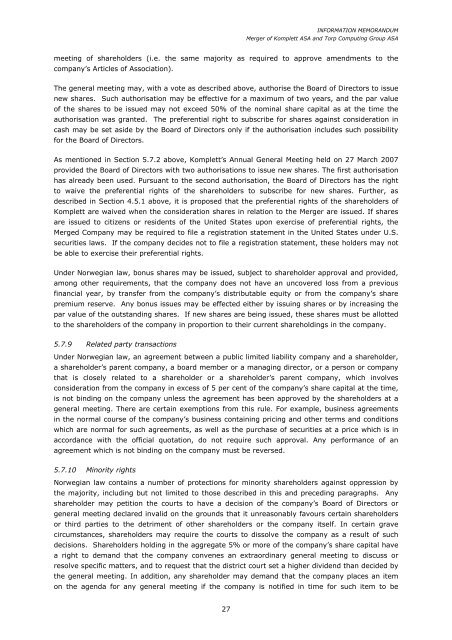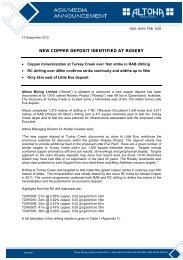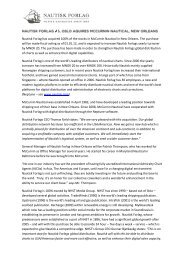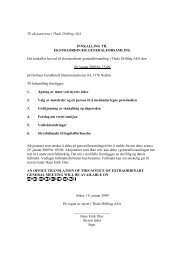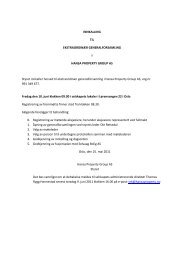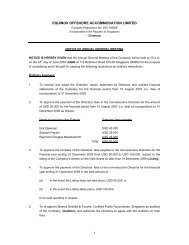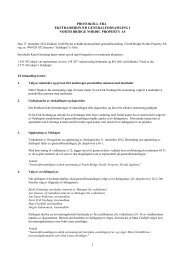Torp Computing Group ASA
Torp Computing Group ASA
Torp Computing Group ASA
Create successful ePaper yourself
Turn your PDF publications into a flip-book with our unique Google optimized e-Paper software.
27<br />
INFORMATION MEMORANDUM<br />
Merger of Komplett <strong>ASA</strong> and <strong>Torp</strong> <strong>Computing</strong> <strong>Group</strong> <strong>ASA</strong><br />
meeting of shareholders (i.e. the same majority as required to approve amendments to the<br />
company’s Articles of Association).<br />
The general meeting may, with a vote as described above, authorise the Board of Directors to issue<br />
new shares. Such authorisation may be effective for a maximum of two years, and the par value<br />
of the shares to be issued may not exceed 50% of the nominal share capital as at the time the<br />
authorisation was granted. The preferential right to subscribe for shares against consideration in<br />
cash may be set aside by the Board of Directors only if the authorisation includes such possibility<br />
for the Board of Directors.<br />
As mentioned in Section 5.7.2 above, Komplett’s Annual General Meeting held on 27 March 2007<br />
provided the Board of Directors with two authorisations to issue new shares. The first authorisation<br />
has already been used. Pursuant to the second authorisation, the Board of Directors has the right<br />
to waive the preferential rights of the shareholders to subscribe for new shares. Further, as<br />
described in Section 4.5.1 above, it is proposed that the preferential rights of the shareholders of<br />
Komplett are waived when the consideration shares in relation to the Merger are issued. If shares<br />
are issued to citizens or residents of the United States upon exercise of preferential rights, the<br />
Merged Company may be required to file a registration statement in the United States under U.S.<br />
securities laws. If the company decides not to file a registration statement, these holders may not<br />
be able to exercise their preferential rights.<br />
Under Norwegian law, bonus shares may be issued, subject to shareholder approval and provided,<br />
among other requirements, that the company does not have an uncovered loss from a previous<br />
financial year, by transfer from the company’s distributable equity or from the company’s share<br />
premium reserve. Any bonus issues may be effected either by issuing shares or by increasing the<br />
par value of the outstanding shares. If new shares are being issued, these shares must be allotted<br />
to the shareholders of the company in proportion to their current shareholdings in the company.<br />
5.7.9 Related party transactions<br />
Under Norwegian law, an agreement between a public limited liability company and a shareholder,<br />
a shareholder’s parent company, a board member or a managing director, or a person or company<br />
that is closely related to a shareholder or a shareholder’s parent company, which involves<br />
consideration from the company in excess of 5 per cent of the company’s share capital at the time,<br />
is not binding on the company unless the agreement has been approved by the shareholders at a<br />
general meeting. There are certain exemptions from this rule. For example, business agreements<br />
in the normal course of the company’s business containing pricing and other terms and conditions<br />
which are normal for such agreements, as well as the purchase of securities at a price which is in<br />
accordance with the official quotation, do not require such approval. Any performance of an<br />
agreement which is not binding on the company must be reversed.<br />
5.7.10 Minority rights<br />
Norwegian law contains a number of protections for minority shareholders against oppression by<br />
the majority, including but not limited to those described in this and preceding paragraphs. Any<br />
shareholder may petition the courts to have a decision of the company’s Board of Directors or<br />
general meeting declared invalid on the grounds that it unreasonably favours certain shareholders<br />
or third parties to the detriment of other shareholders or the company itself. In certain grave<br />
circumstances, shareholders may require the courts to dissolve the company as a result of such<br />
decisions. Shareholders holding in the aggregate 5% or more of the company’s share capital have<br />
a right to demand that the company convenes an extraordinary general meeting to discuss or<br />
resolve specific matters, and to request that the district court set a higher dividend than decided by<br />
the general meeting. In addition, any shareholder may demand that the company places an item<br />
on the agenda for any general meeting if the company is notified in time for such item to be


